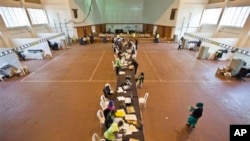Vote counting from Kenya's presidential election continued Wednesday as officers of the independent electoral commission delivered ballots from around the country to the national tally center in Nairobi. Debate now surrounds what to do with rejected votes, a decision that could determine whether someone wins in the first round.
Two days after millions of Kenyans voted to elect the country’s fourth president, the vote-tallying process has become embroiled in controversy.
The point of contention is a pile of rejected votes, now estimated to number 500,000.
Joaquim Chissano, head of the AU observer mission and former president of Mozambique, noted his concern.
"The African Union election observation mission, however, notes with concern the high level of rejected ballots which may have resulted from inadequate voter registration in the run-up to the elections. Although the mission recognizes efforts made by the IEBC to conduct voter education, it is of the view that these were not fully satisfactory," Chissano said.
If rejected ballots are included in the total vote tally, it would likely dilute the frontrunners' current share and make it more difficult for either of the leading candidates to receive the absolute majority required to win without a second round.
Candidate Uhuru Kenyatta’s Jubilee Coalition accused British High Commissioner Christian Turner and Maina Kiai, a prominent Kenyan human rights activist, of trying to influence the electoral commission's decision about counting rejected votes. Jubilee called the alleged interference "an attempt to deny the Jubilee Coalition outright victory."
According to provisional results, Kenyatta is leading in the vote count over Raila Odinga, Kenya's prime minister.
Responding to Jubilee’s statement, Maina Kiai said Kenya’s constitution clearly states that a candidate must receive more than half of all votes cast to win an election.
The British Foreign Office said it was neutral and did not endorse any candidate over another. The British statement denied Jubilee’s accusations, saying, "Claims of British interference, including by the High Commission, in the electoral process are entirely false and misleading."
Jubilee’s vice presidential candidate William Ruto urged the independent electoral commission to speed up the counting.
"We want to state the Jubilee Coalition supports the IEBC in releasing these official results but we want to request they expedite the release of the result," Ruto said.
On Wednesday night, electoral commission Chairman Issack Hassan predicted the official results would be out by Friday.
"Please allow the commission to finish this exercise. I want to assure you all the votes will be counted," Hassan said.
He reminded Kenyans the commission legally has until Monday, one week after election day, to announce the results.
Rejected Votes in Kenya Spur Controversy

NAIROBI —










